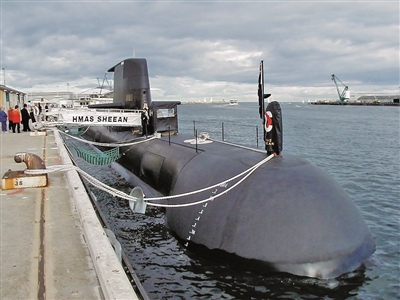By Ji Cheng

The US, the UK and Australia announced on September 15 to form a new military alliance called AUKUS, under which the US and the UK will provide Australia with nuclear submarine technology and help it form a nuclear submarine fleet as a demonstration of the alliance's early-stage cooperation. This means Canberra has unilaterally torn apart its USD 66billion (about RMB 438.9 billion) deal with France of 12 conventional submarines.
The nuclear submarine cooperation among Washington, London and Canberra further reflects the conflicts and rifts within the western world and exposes relevant countries’ exercise of “double standards” on the issue of nuclear non-proliferation. The step may cause overspill effects that will aggravate the arms race among regional countries and sabotage regional peace.
France responded most vehemently to the nuclear submarine deal among AUKUS. French foreign minister and defense minister issued a joint statement on September 15 accusing the US of forcing France to give up its submarine procurement agreement with Australia and pushing it out of the structural partnership with Australia, which is indeed an unpredictable “stab in the back”. It also slammed Canberra’s betrayal of their spirit of cooperation as unacceptable. As a result, France canceled celebrations at the French Embassy in the United States to mark the 240th anniversary of the Battle of Chesapeake Bay. On September 17, French President Macron called back French ambassadors to the US and Australia to discuss Canberra’s unilateral breach of the agreement.
New Zealand, also a member of the Five Eyes alliance, felt indignant at Australia’s development of nuclear submarines, and its Prime Minister Jacinda Ardern said New Zealand will continue to implement the ban on nuclear-powered vessels that took effect in 1985, and would never allow Australia’s nuclear submarines to enter its waters.
Adam Bandt, Parliamentary Leader of the Australian Greens, didn’t support Morrison’s choice and compared nuclear submarines to a “floating Chernobyl” in the current maritime security environment. Canberra blindly following Washington’s military strategy will put itself at the “forefront” of an escalated regional conflict and that doesn’t fit its position as a “middle power”.
Besides, considering the long period needed for the design and construction of nuclear submarines, and the long talks about related sensitive technologies, even Morrison has to admit that the submarine may not be able to serve until 2040.
In her recent State of the Union address, President of the European Commission Ursula von der Leyen said “what has held us back until now is not just a shortfall of capacity – it is the lack of political will.” After the recent incident, France, as the chief proponent of EU integration, has displayed a strong will to reinforce Europe’s “strategic independence”. Taking the opportunity of hosting the Summit on European defence next year, it will definitely take steps to further converge the parties and get ready for taking military interventions without the participation of NATO.
As nuclear states, the US and the UK have strictly restricted and suppressed the nuclear programs of countries like Iran, yet they are now supporting Australia in developing military-use nuclear technologies – such practice of double standards is indeed too flagrant and outrageous. In the meanwhile, as a contracting party to the Treaty on the Non-Proliferation of Nuclear Weapons (NPT) and the South Pacific Nuclear-Free Zone Treaty, Australia’s insistence on developing nuclear submarines incurs questions on its sincerity in honoring its commitment under the treaties.
Trying to forge an exclusive regional security alliance based on their Cold War and zero-sum mindset and ideology, the US, the UK and Australia will exacerbate the arms race among relevant countries and undermine the enduring peace and stability in the region.













